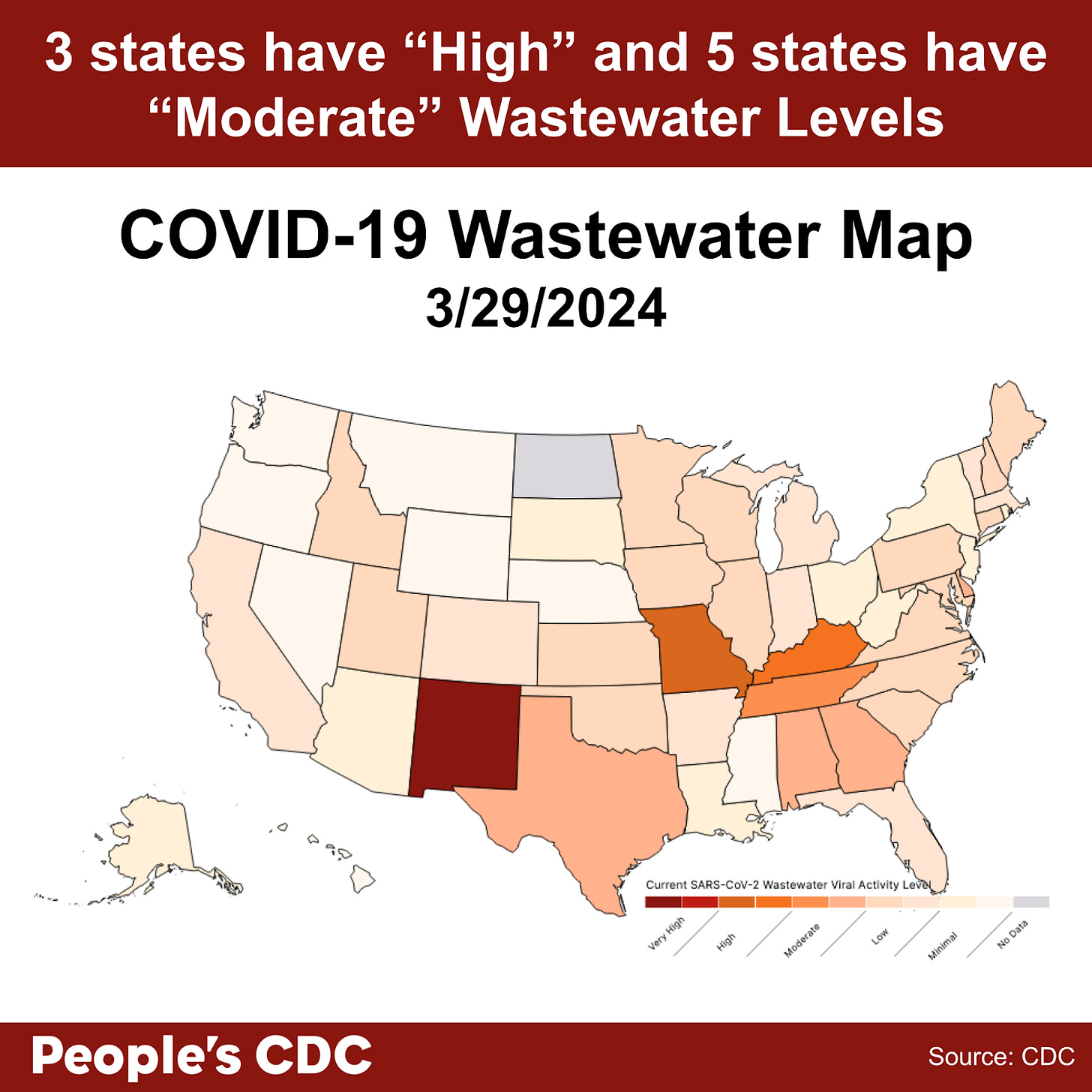People’s CDC April 1, 2024, COVID-19 Weather Report
COVID wastewater levels are decreasing. As of 3/29/24, New Mexico is “Very High,” Arkansas and Kentucky are “High,” and the rest of the states are “Moderate” to “Low” levels of SARS-CoV-2 detected in
April 1, 2024
The Weather
A study in Clinical Infectious Diseases reported “that the risk of developing symptomatic illness within 14 days was 5 times greater when contacts were exposed to an asymptomatic [COVID]-positive child in their household.” Nearly 11% of household contacts developed symptoms within 14 days of exposure. The study also found, during a 3-month follow-up, that 6 out of 77 asymptomatic children developed Long COVID. The likelihood of developing symptoms from asymptomatic exposure is higher than we might expect. Continue to spread awareness of asymptomatic spread and advocate for increased infection control measures at your local schools.
COVID wastewater levels are decreasing. As of 3/29/24, New Mexico is “Very High,” Arkansas and Kentucky are “High,” and the rest of the states are “Moderate” to “Low” levels of SARS-CoV-2 detected in wastewater.
Wastewater levels continue to show a downward trend in the provisional data (gray shaded area) in all regions. The national wastewater levels are overall indicated as “Low.” While lower wastewater levels indicate decreased spread, it is important to continue to take precautions against infection. Holidays and spring breaks may bring people in closer proximity, so be sure to wear a mask to protect yourself and your community.
Wins
As we work to take more actions against the removal of vital public health measures, we remind you that you can still watch the recording of the People’s CDC press conference from March 13 and read the press release here. We would also like to remind you of the pre-proof of the People’s CDC External Review in the American Journal of Preventive Medicine Focus. The publication highlights the shortcomings of the CDC’s approach to public health and recommends a more equitable pandemic response.
News sources have published articles about the frustrations of people who continue to take COVID precautions. Time Magazine published an article presenting “both sides,” highlighting protest from people working with the CDC and concern from citizens and experts alike. While we are glad to see our voices be published in popular media, we are also saddened that “returning to normal” under economic and political pressure is so valued.
Treatments
Invyvid has received an FDA emergency use authorization for Pemgarda, a pre-exposure prophylaxis (PrEP) for people with immunocompromising conditions. Pemgarda is approved for people 12 and older with moderate to severe immunocompromise who are less likely to produce an adequate immune response to COVID vaccination alone. According to a press release from Invyvid, Pemgarda will release to market “imminently.”
Pre-exposure prophylaxis is commonly used for folks at high risk for exposure to HIV. As access to PrEP for HIV has been instrumental in keeping people safe, we hope that PrEP for COVID will be a useful tool for our community members with immune compromise. We also urge you to continue to wear high-quality masks and take other precautions to protect those most vulnerable.
Long COVID
People Magazine recently published an article highlighting an essay by Ziyad Al-Aly, physician and clinical epidemiologist, that pools data from several studies showing that COVID infection has lasting impacts on brain health. The review points out several impacts to cognitive functioning, including memory loss, spatial reasoning, and planning. Additionally, imaging studies have shown significant impact to brain tissue from inflammation, among other processes. The publication may be validating to those who experience lower cognitive function following COVID infection, including brain fog and memory dysfunction.
Take Action
We know that taking precautions–including masking, testing, and improving air quality–helps prevent the spread of airborne viral infection. Introducing more stringent precautions slowed outbreaks in the hematology ward of a hospital. The CDC recently released tips to improve ventilation. Help us urge the CDC to take other measures, including reinstating isolation periods.
Additionally, the home Test to Treat program is ending in April 2024. The program provides un-or-underinsured adults with free COVID and flu tests. If a participant in the program tests positive, they can also receive free healthcare via telehealth services. Join us to help save the program that helps so many at-risk people!
Notes: 1) The numbers in this report were current as of 3/29/2024. 2) Changes in testing access as well as data reporting have led many federal data sources to become less reliable. 3) Check out the links throughout & see our website for more! https://peoplescdc.org. 4) Subscribe to our newsletter: People's CDC | Substack.




